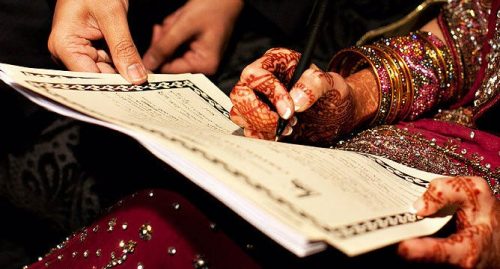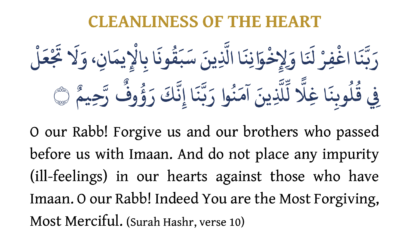Hadith on Marriage Proposals
Nikah is an Ibadah. It is completion of deen. Let us read some authentic Hadith on Marriage Proposals
Whoever is not able to marry may Fast
يَا مَعْشَرَ الشَّبَابِ مَنِ اسْتَطَاعَ الْبَاءَةَ فَلْيَتَزَوَّجْ، فَإِنَّهُ أَغَضُّ لِلْبَصَرِ، وَأَحْصَنُ لِلْفَرْجِ، وَمَنْ لَمْ يَسْتَطِعْ فَعَلَيْهِ بِالصَّوْمِ، فَإِنَّهُ لَهُ وِجَاءٌ ”.
Narrated `Abdullah: We were with the Prophet (ﷺ) while we were young and had no wealth. So Allah’s Messenger (ﷺ) said, “O young people! Whoever among you can marry, should marry, because it helps him lower his gaze and guard his modesty (i.e. his private parts from committing illegal sexual intercourse etc.), and whoever is not able to marry, should fast, as fasting diminishes his sexual power.”
Hadith on Marriage Proposals: What type of women should one seek in marriage?
Narrated Abu Huraira: The Prophet (ﷺ) said, “The best women are the riders of the camels and the righteous among the women of Quraish. They are the kindest women to their children in their childhood and the more careful women of the property of their husbands.” Sahih al-Bukhari 5082
خَيْرُ نِسَاءٍ رَكِبْنَ الإِبِلَ صَالِحُو نِسَاءِ قُرَيْشٍ، أَحْنَاهُ عَلَى وَلَدٍ فِي صِغَرِهِ وَأَرْعَاهُ عَلَى زَوْجٍ فِي ذَاتِ يَدِهِ ”.
Narrated Abu Huraira: The Prophet (ﷺ) said, “A woman is married for four things, i.e., her wealth, her family status, her beauty and her religion. So you should marry the religious woman (otherwise) you will be a losers. : Sahih al-Bukhari 5090
عَنِ النَّبِيِّ صلى الله عليه وسلم قَالَ “ تُنْكَحُ الْمَرْأَةُ لأَرْبَعٍ لِمَالِهَا وَلِحَسَبِهَا وَجَمَالِهَا وَلِدِينِهَا، فَاظْفَرْ بِذَاتِ الدِّينِ تَرِبَتْ يَدَاكَ ”.
None should ask for the hand of a lady who is already engaged to his brother (Muslim)
Narrated Ibn `Umar: The Prophet (ﷺ) decreed that one should not try to cancel a bargain already agreed upon between some other persons (by offering a bigger price). And a man should not ask for the hand of a girl who is already engaged to his Muslim brother, unless the first suitor gives her up, or allows him to ask for her hand. Sahih al-Bukhari 5142
يُحَدِّثُ أَنَّ ابْنَ عُمَرَ ـ رضى الله عنهما ـ كَانَ يَقُولُ نَهَى النَّبِيُّ صلى الله عليه وسلم أَنْ يَبِيعَ بَعْضُكُمْ عَلَى بَيْعِ بَعْضٍ، وَلاَ يَخْطُبَ الرَّجُلُ عَلَى خِطْبَةِ أَخِيهِ، حَتَّى يَتْرُكَ الْخَاطِبُ قَبْلَهُ، أَوْ يَأْذَنَ لَهُ الْخَاطِبُ.
The father or the guardian cannot give a virgin or matron in marriage without her consent
Narrated Abu Huraira:
The Prophet (ﷺ) said, “A matron should not be given in marriage except after consulting her; and a virgin should not be given in marriage except after her permission.” The people asked, “O Allah’s Messenger (ﷺ)! How can we know her permission?” He said, “Her silence (indicates her permission).Sahih al-Bukhari 5136
أَنَّ النَّبِيَّ صلى الله عليه وسلم قَالَ ” لاَ تُنْكَحُ الأَيِّمُ حَتَّى تُسْتَأْمَرَ وَلاَ تُنْكَحُ الْبِكْرُ حَتَّى تُسْتَأْذَنَ ”. قَالُوا يَا رَسُولَ اللَّهِ وَكَيْفَ إِذْنُهَا قَالَ ” أَنْ تَسْكُتَ ”.
Hadith on Marriage Proposals: Conditions not lawful in the Nikah Marriage contract
Narrated Abu Huraira: The Prophet (ﷺ) said, “It is not lawful for a woman (at the time of wedding) to ask for the divorce of her sister (i.e. the other wife of her would-be husband) in order to have everything for herself, for she will take only what has been written for her.” Sahih al-Bukhari 5152
عَنْ أَبِي هُرَيْرَةَ ـ رضى الله عنه ـ عَنِ النَّبِيِّ صلى الله عليه وسلم قَالَ “ لاَ يَحِلُّ لاِمْرَأَةٍ تَسْأَلُ طَلاَقَ أُخْتِهَا لِتَسْتَفْرِغَ صَحْفَتَهَا، فَإِنَّمَا لَهَا مَا قُدِّرَ لَهَا ”.
To note:
An engagement is not NIKAH and doesn’t permit interaction between the couple. They remain ghaer marham and should observe the shariah guidelines. Nikah should not be delayed.
Also read :
Discover more from Islam Hashtag
Subscribe to get the latest posts sent to your email.





